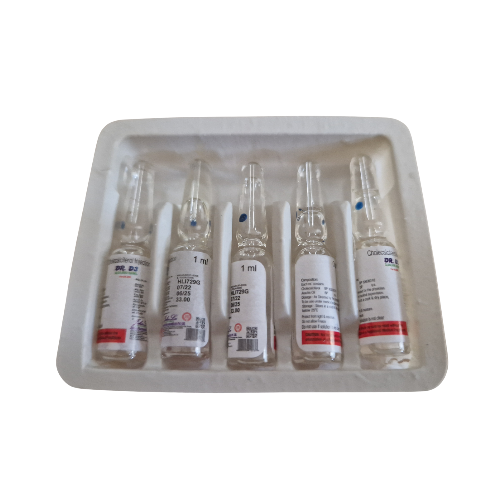All orders will be shipped within 2-3 working days. Thank you for your patience and understanding ✨️
Vitamin D3 Ampoules - 600,000iu
£26.30
Pre-order
6 Ampoules - 1ml each
Out of stock, available for pre-order
Product Details
Vitamin D3 (Cholecalciferol) Ampoules for Injections
Product Details:
- Vitamin D3 600,000iu per 1ml ampoule
- 6 Ampoules per pack
- Expiry Date: 06/2025
Please note these are high dose vitamin D3 Ampoules and as D3 is a fat soluble vitamin, one injection every 6 months is the recommended dosage.
Included:
- 6 free needles - IM or subcutaneous administration
- 6 alcohol-free swabs
Each order comes with detailed instructions.
Cholecalciferol vials - perfect for spas and beauticians.
VITAMIN D3 Injections
Vitamin D plays a crucial role in many bodily functions, including bone health, immune function, and mood regulation. Vitamin D can be obtained from food sources, supplements, or through exposure to sunlight.
Health and Beauty Benefits of Vitamin D3 Injections:
1. Stronger immune system: Vitamin D3 is known to help boost the immune system, reducing the risk of infections and illnesses.
2. Healthy bones and teeth: Vitamin D3 plays a crucial role in calcium absorption, leading to stronger bones and teeth.
3. Improved mood: Vitamin D3 is often called the "sunshine vitamin" as it can help improve mood and combat symptoms of depression.
4. Weight management: Studies have shown that adequate levels of vitamin D3 in the body may help with weight management and reduce the risk of obesity.
5. Healthy skin: Vitamin D3 can help promote healthy skin by reducing inflammation and acne.
While vitamin D3 injections are generally safe for most people, there are certain contraindications or situations where caution should be exercised.
Contraindications
Some of the contraindications for vitamin D3 injections include:
1. Hypercalcemia: Vitamin D can increase calcium absorption in the body. Individuals with existing hypercalcemia (high levels of calcium in the blood) should avoid vitamin D3 injections, as it can further elevate calcium levels and lead to complications.
2. Granulomatous disorders: Individuals with granulomatous disorders, such as sarcoidosis or tuberculosis, may be at increased risk of developing hypercalcemia when receiving vitamin D3 injections. In these cases, close monitoring of calcium levels is essential.
3. Hypersensitivity: Individuals who have a known hypersensitivity or allergy to vitamin D or any of the components in the injection should avoid vitamin D3 injections.
4. Certain medical conditions: People with certain medical conditions, such as kidney disease, liver disease, or certain cancers, should use caution when receiving vitamin D3 injections. In these cases, close monitoring of vitamin D levels and calcium levels is important to prevent potential complications.
5. Pregnancy and breastfeeding: While vitamin D supplementation is generally safe during pregnancy and breastfeeding, it is important to consult with a healthcare provider before starting vitamin D3 injections to ensure proper dosage and safety.
It is important to discuss any existing health conditions, medications, and concerns with a healthcare provider before starting vitamin D3 injections. Vitamin D levels should be regularly monitored, especially when receiving injections, to prevent potential adverse effects. In some cases, alternative forms of vitamin D supplementation or routes of administration may be recommended based on individual health needs and circumstances.
Instructions for Injecting Vitamin D3:
Please ensure to advise that one injection every 6 months is enough for this high dose D3 injection ampoule.
1. Consult with a healthcare provider: Before starting vitamin D3 injections, it is crucial to consult with a healthcare provider to determine the appropriate dosage and frequency for your specific needs.
2. Gather supplies: You will need a vial of vitamin D3, a clean syringe, an alcohol swab, and a safe disposal container.
3. Prepare the injection site: Clean the injection site with an alcohol swab and allow it to dry completely.
4. Draw up the vitamin D3: Use the syringe to draw up the prescribed amount of vitamin D3 from the vial.
5. Inject the vitamin D3: Insert the needle into the cleaned injection site at a 90-degree angle and slowly inject the vitamin D3.
6. Dispose of the syringe: Safely dispose of the used syringe in a designated sharps container.
7. Monitor for any side effects: Keep track of any side effects or reactions after the injection and consult with your healthcare provider if you experience any adverse effects.
Remember to always follow the instructions provided by your healthcare provider when injecting vitamin D3 to ensure safe and effective use.
Save this product for later
Customer reviews
Reviews only from verified customers
No reviews yet. You can buy this product and be the first to leave a review.
Display prices in:GBP

